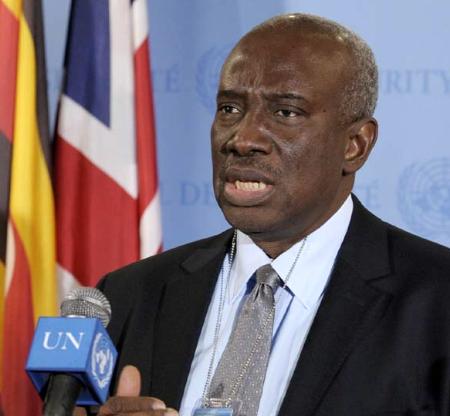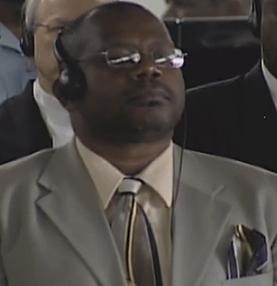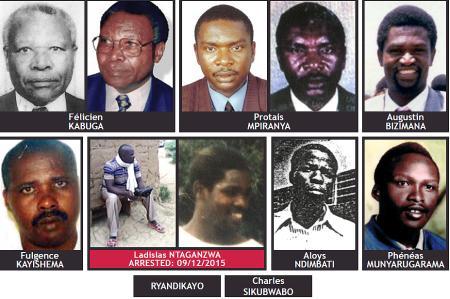Monday December 14, 2015 -
After 20 years the
International Criminal Tribunal for Rwanda (ICTR) has
today delivered its last verdict sitting as a court in
Arusha, Tanzania. It gave its decision on the appeals of
a notorious killer group known as the Butare 6 led by a
former minister, one Pauline Nyiramasuhuko.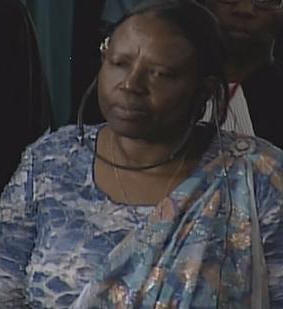 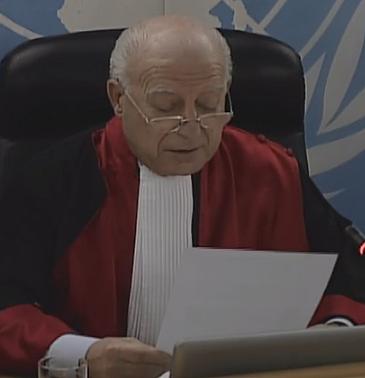 The ICTR may have concluded its sittings in the Tanzanian city of Arusha, but its work to bring to justice all those connected with the 1994 genocide in Rwanda will continue with a residual court ready to meet anywhere to look into matters relating to its mandate - bringing to justice all those deemed to have been the brains behind the slaughter of close to a million moderate Hutus and Tutsis. Just as the Special Court for Sierra Leone has its own Residual Court to handle such matters - the ICTR has what it calls the Mechanism. The ICTR still has a number of fugitives it would dearly love to bring to justice, among them the notorious and affluent Félicien Kabuga who is believed to have connections with highly placed government officials in East and Central Africa willing to cover his tracks as justice officials try to arrest him. Kindly recall why the ICTR was set up as found on its website. "The United Nations Security Council established the International Criminal Tribunal for Rwanda to "prosecute persons responsible for genocide and other serious violations of international humanitarian law committed in the territory of Rwanda and neighbouring States, between 1 January 1994 and 31 December 1994". Since it opened in 1995, the Tribunal has indicted 93 individuals whom it considered responsible for serious violations of international humanitarian law committed in Rwanda in 1994. Those indicted include high-ranking military and government officials, politicians, businessmen, as well as religious, militia, and media leaders. The ICTR is the first ever international tribunal to deliver verdicts in relation to genocide, and the first to interpret the definition of genocide set forth in the 1948 Geneva Conventions. It also is the first international tribunal to define rape in international criminal law and to recognise rape as a means of perpetrating genocide. Another landmark was reached in the "Media case", where the ICTR became the first international tribunal to hold members of the media responsible for broadcasts intended to inflame the public to commit acts of genocide. One key function assumed by the Mechanism is the tracking and arrest of the three accused who remain fugitives from justice. The ICTR indicted Félicien Kabuga, Protais Mpiranya, and Augustin Bizimana on charges of genocide and crimes against humanity, but the accused have to date evaded justice. The continued cooperation of national governments and the international community as a whole is of paramount importance to the successful apprehension of these fugitives. When apprehended, the Mechanism will conduct their trials and supervise any sentence imposed along with all of the sentences previously imposed by the ICTR. This is a part of the summary of the court's decision on the appeals lodged on behalf of the Butare 6. The full summary could be found here. "The Appeals Chamber today delivered its judgement on the appeals lodged by Pauline Nyiramasuhuko, Arsène Shalom Ntahobali, Sylvain Nsabimana, Alphonse Nteziryayo, Joseph Kanyabashi, Élie Ndayambaje, and the Prosecution. This last judgement of the Appeals Chamber brings an end to the Tribunal’s judicial activity. Nyiramasuhuko served as Minister of Family and Women’s
Development under the interim government in 1994.
Ntahobali, Nyiramasuhuko’s son, was a student and
part‑time manager of Hotel Ihuliro in Butare-ville
Sector in April 1994. Nsabimana was appointed prefect of
Butare on 19 April 1994 and served in that position
until 17 June 1994 when he was replaced by Nteziryayo.
Kanyabashi was the bourgmestre of Ngoma Commune during
the events at issue. Ndayambaje served as bourgmestre of
Muganza Commune from 18 June 1994 until he left Rwanda
on 7 July 1994. On 24 June 2011, Trial Chamber II convicted
Nyiramasuhuko, Ntahobali, Nsabimana, Kanyabashi, and
Ndayambaje of genocide, crimes against humanity, and one
or more serious violations of Article 3 common to the
Geneva Conventions and of Additional Protocol II. The
Trial Chamber also convicted Nyiramasuhuko of conspiracy
to commit genocide and found Nteziryayo, Kanyabashi, and
Ndayambaje guilty of direct and public incitement to
commit genocide. The Trial Chamber sentenced
Nyiramasuhuko, Ntahobali, and Ndayambaje to life
imprisonment and imposed sentences of 25, 30, and 35
years of imprisonment on Nsabimana, Nteziryayo, and
Kanyabashi, respectively. (i) killing a Tutsi girl he had first raped at the Hotel Ihuliro roadblock in late April 1994; (ii) ordering the killing of a man named Léopold Ruvurajabo at the Hotel Ihuliro roadblock on 21 April 1994, the killing of Tutsis at the Institut de recherche scientifique et technique on 21 April 1994, and the killing of Tutsis who had sought refuge at the Butare Prefecture Office during an attack there in mid-May 1994; and (iii) aiding and abetting the killings of Tutsis abducted from the École évangéliste du Rwanda between mid-May and early June 1994. The Appeals Chamber further affirmed Ntahobali’s criminal responsibility for: (i) raping a Tutsi girl near the Hotel Ihuliro roadblock in late April 1994 as well as Witness TA during two attacks in May 1994 at the prefectoral office; (ii) ordering the rape of Witness TA at the prefectoral office during an attack in the last of half of May 1994; and (iii) aiding and abetting the rapes of
Witness TA at the prefectoral office in June 1994. The Appeals Chamber affirmed Nsabimana’s convictions on the basis of aiding and abetting by omission the killing of Tutsis who had sought refuge at the Butare Prefecture Office by failing to discharge his duty to provide assistance to people in danger and to protect civilians against acts of violence. It also affirmed Nteziryayo’s convictions for direct and public incitement to commit genocide on the basis that he made speeches that constituted direct appeals to the population to kill Tutsis at public meetings held in Muyaga and Kibayi Communes in mid to late June 1994 and at the 22 June 1994 swearing-in ceremony of Ndayambaje as the new bourgmestre of Muganza Commune. Having considered the impact of its findings on appeal, in particular that the six appellants’ right to be tried without undue delay had been violated, the Appeals Chamber reduced the life sentences imposed by the Trial Chamber on Nyiramasuhuko, Ntahobali, and Ndayambaje, to 47 years of imprisonment for each of them. With respect to Nsabimana, Nteziryayo, and Kanyabashi, the Appeals Chamber further found certain errors in the Trial Chamber’s determination of their respective sentences, and considering the impact of all its findings, reduced Nsabimana’s sentence to 18 years of imprisonment, Nteziryayo’s sentence to 25 years of imprisonment, and Kanyabashi’s sentence to 20 years of imprisonment. Considering time already served, the Appeals Chamber ordered Nsabimana’s and Kanyabashi’s immediate release. A study of the case of Pauline Nyiramasuhuko shows just how the human being can, at an opportune moment, become worse than the most savage of beasts. Here was a woman from a poor background who with determination and the will to prove that being born poor is not a condemnation, got academic and other qualifications that would make her the perfect loving mother, the perfect African woman who cares for the needy in any community she knows that needs her help. And what changed? She found herself in a position of trust and power with the right connections including having a school mate being married to the President of Rwanda. One online columnist, Peter Landesman has written a piece from which we bring you this excerpt. He calls it - A Woman's Work - "Slaughter, and then worse, came to
Butare, a sleepy, sun-bleached Rwandan town, in the
spring of 1994. Hutu death squads armed with machetes
and nail-studded clubs had deployed throughout the
countryside, killing, looting and burning. Roadblocks
had been set up to cull fleeing Tutsis. By the third
week of April, as the Rwanda genocide was reaching its
peak intensity, tens of thousands of corpses were
rotting in the streets of Kigali, the country's capital.
Butare, a stronghold of Tutsis and politically moderate
Hutus that had resisted the government's orders for
genocide, was the next target. Its residents could hear
gunfire from the hills in the west; at night they
watched the firelight of torched nearby villages. Armed
Hutus soon gathered on the edges of town, but Butare's
panicked citizens defended its borders. According to an eyewitness I spoke with this summer in Butare, supervising from the sidelines was Pauline, then 48, a portly woman of medium height in a colorful African wrap and spectacles. Before becoming Rwanda's chief official for women's affairs, Pauline was a social worker, roaming the countryside, offering lectures on female empowerment and instruction on child care and AIDS prevention. Her days as minister were similarly devoted to improving the lives of women and children. But at the stadium, a 30-year-old
farmer named Foster Mivumbi told me, Pauline assumed a
different responsibility. Mivumbi, who has confessed to
taking part in the slaughter, told me that Pauline
goaded the Interahamwe, commanding, ''Before you kill
the women, you need to rape them.'' Tutsi women were
then selected from the stadium crowd and dragged away to
a forested area to be raped, Mivumbi recalled. Back at
the stadium, he told me, Pauline waved her arms and then
observed in silence as Interahamwe rained machine-gun
fire and hand grenades down upon the remaining refugees.
The Hutus finished off survivors with machetes. It took
about an hour, ending at noon. Pauline stayed on,
Mivumbi told me, until a bulldozer began piling bodies
for burial in a nearby pit. (When questioned about this
incident, Pauline's lawyers denied that she took part in
atrocities in Butare.) Other survivors told me they heard the minister for women and family affairs spit invectives at Tutsi women, calling them ''cockroaches'' and ''dirt.'' She advised the men to choose the young women for sex and kill off the old. By one account, women were forced to raise their shirts to separate the mothers from the ''virgins.'' Sometimes, I was told, Pauline handed soldiers packets of condoms. Much of the violence took place in the scrubby yard in front of Butare's local government offices, or prefecture, where at one point hundreds of Tutsis were kept under guard. Witnesses recalled that Pauline showed
up at night in a white Toyota pickup truck, often driven
by Shalom, and supervised as Interahamwe loaded the
truck with women who were driven off and never seen
again. Often, when a woman at the prefecture saw
Pauline, she appealed to her, as a fellow woman and
mother, for mercy. But this, claimed survivors, only
enraged Pauline. When one woman wouldn't stop crying
out, a survivor recalled, the minister told the
Interahamwe to shut her up. They stabbed the pleading
woman and then slit her throat.
In July 1994 Pauline fled Rwanda in a mass exodus of more than one million Hutus fearing retribution by the advancing Tutsi rebel army, the Rwandan Patriotic Front. After finding safety in a refugee camp in Congo, she eventually slipped into Kenya, where she lived as a fugitive for almost three years. On July 18, 1997, however, Pauline was apprehended in Nairobi by Kenyan and international authorities. (Shalom was seized six days later, in a Nairobi grocery store he was running.) After interrogation by investigators, Pauline was transferred with Shalom to Tanzania, where both were delivered to the International Tribunal in Arusha.) Pauline has consistently denied the charges against her. In 1995, before she was arrested, she gave an interview to the BBC in a squalid Hutu refugee camp across the Congo border, where she had been leading the camp's social services; her job duties included the reuniting of separated parents and children. When asked what she did during the war, Pauline replied: ''We moved around the region to pacify. We wrote a pacification document saying people shouldn't kill each other. Saying it's genocide, that's not true. It was the Tutsi who massacred the Hutu.'' Told that witnesses had accused her of murder, Pauline shot back: ''I cannot even kill a chicken. If there is a person who says that a woman -- a mother -- killed, then I'll confront that person.'' The crimes Pauline Nyiramasuhuko are accused of are monstrous. Her capacity for pity and compassion, and her professional duty to shield the powerless, deserted her, or collapsed under the irresistible urge for power. But in seeking a reasonable explanation for Pauline's barbarity, I remembered something that Alison Des Forges of Human Rights Watch told me. ''This behavior lies just under the surface of any of us,'' Des Forges said. ''The simplified accounts of genocide allow distance between us and the perpetrators of genocide. They are so evil we couldn't ever see ourselves doing the same thing. But if you consider the terrible pressure under which people were operating, then you automatically reassert their humanity -- and that becomes alarming. You are forced to look at these situations and say, 'What would I have done?' Sometimes the answer is not encouraging.'' Pauline did possess humanity, but it was in short supply, and she reserved it for her only son, Shalom, whom she had helped turn into a rapist and a killer. In one of her last moments as an engineer of the genocide, however, she returned to her role as woman and mother. It was in July 1994, right when the Hutu Army was collapsing. Butare had descended into mayhem, and Pauline's side had lost. One of Pauline's neighbors, Lela, spotted the minister in the streets. ''I saw Pauline and Shalom at a roadblock,'' she said. ''Pauline was wearing military fatigues, and she was still trying to separate Tutsis and Hutus, but the confusion was massive. There were people running everywhere. The Rwandan Patriotic Front was coming.'' A short time later, Lela saw Pauline again. This time she was standing alone outside her home, looking worried. ''I was shocked,'' Lela said. ''She was wearing camouflage. She was standing upright in her uniform like a soldier, trying to see what was happening up and down the road. She just looked furious. She was looking everywhere for Shalom. He was her pet. She loved Shalom so much.''
|


